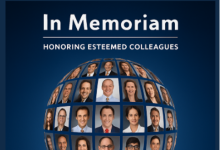Building an ACR Annual Meeting for the Whole World Save

The ACR Annual Meeting (now the ACR Convergence) has always been the gathering of our international rheumatology community, but never more so than now. On the eve of the first annual meeting run virtually, what does this mean for the thousands of international attendees, who usually flock from around the world?
For many rheumatologists around the world, coming to America was a pilgrimage of sorts – a special treat of great importance, where we could feel in the majority rather than the minority. An opportunity to savor the delights of the United States, no question, but also an opportunity to imbibe the latest our speciality has to offer and to engage with those from all corners of the world who enjoy the same. A long journey and an expensive exercise but a worthy one – a fundamentally human exchange of ideas, where the person in the lecture theater seat next to you or standing next to you in the poster hall could be from Arkansas, Alberta, or Amsterdam, but equally from Argentina, Algeria, Azerbaijan, or even Australia.
Of course, what was desirable in the past is no longer. So how (dare I say, on earth) do we translate that to our electronic screens? How can that human interaction be preserved on a web portal?
That has been the challenge for the ACR. There has been scant effective precedent before this year, and those who have come before have been learning as they go. At the same time, this represented a chance to not just to attempt replicate but to grow – to democratize the experience for those internationally who struggled to find the money or time to attend previously, or those with personal commitments which preclude several days at a stretch.
The ACR have risen to the challenge, with gusto. While in-person human interaction can never be perfectly matched, webinar fatigue is palpable, and everyone (including the ACR) looks forward to a day in the near future where we can physically meet, the virtual meeting has looked to do more than just record things online: it has sought to preserve what is most important, particularly the human interactions, while taking the chance to innovate positively. “I am sure there will be some hits and misses,” said Donna Hoyne, Vice President (Education) for the ACR, “but hopefully everyone will have a great week, and it will be a respite from the crazy year”.
Every ACR annual meeting takes months to plan, with the schedule usually finalized in January, so when the ACR was forced to make it virtual, a whole program needed to be revised and resubmitted. Nevertheless, this has been structured without neglecting the needs of international attendees – in fact, it might be easier than ever.
Apart from obvious logistic advantages for international attendees, sessions have been scheduled to work favourably in multiple different time zones, with plenty of content at the beginning and the end of the day. The pre-recorded format allows for asynchronous learning, a massive boon in trying to harness all the strong content that each year’s meeting brings. At the same time, the virtual networking platforms are intuitive and straightforward, and may even allow for better communication in some ways. Broad consultation and assessment of over twenty different platforms have yielded a platform which has received praise so far, when the default position for most conferences is usually the opposite. It seems likely that some of the best performing components of this new approach to scheduling and delivery will be preserved in the long term, to the benefit of rheumatologists around the globe.
The global community has responded, as well: despite plenty of other distractions, attendance is as strong as ever, with almost 16,000 attendees from 111 countries. The ACR Annual Meeting has been visible in its efforts in recent years to evolve for the benefit of its attendees, but maybe, even in the absence of the physical meeting which we all miss, pandemic measures can lead to some positive change.










If you are a health practitioner, you may Login/Register to comment.
Due to the nature of these comment forums, only health practitioners are allowed to comment at this time.